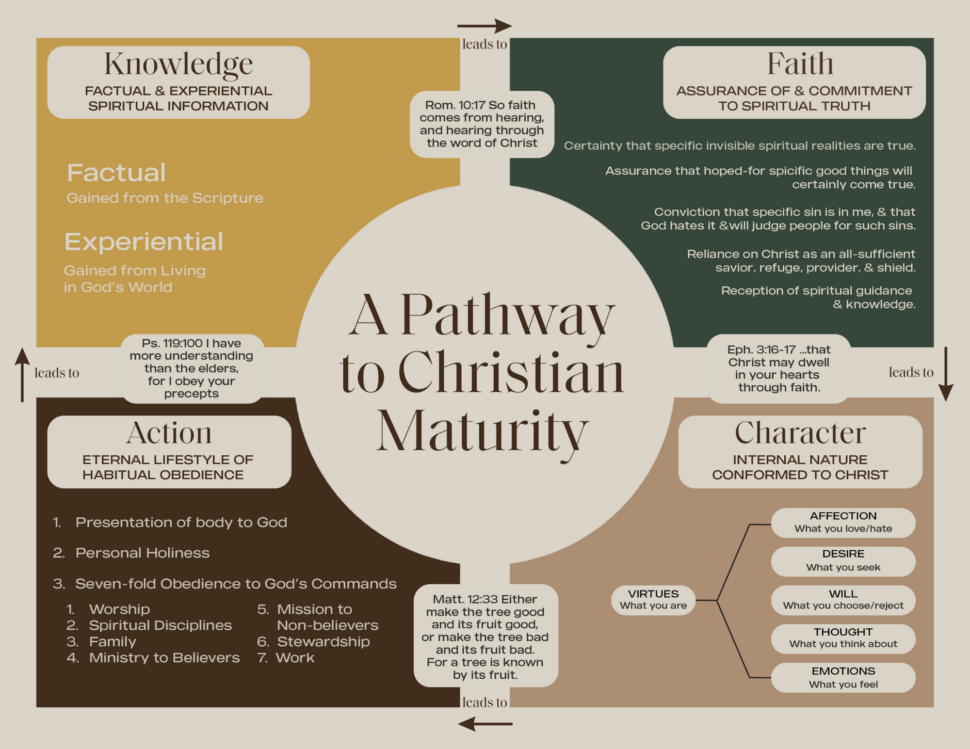
For every Christian, God set two infinite journeys: the external journey of spreading the Gospel worldwide and the internal journey of moving from sin to perfection in Christ.
God has set before the Church of Jesus Christ two infinite journeys:
1) The external journey of the worldwide advance of the Kingdom of Jesus Christ to all nations
2) The internal journey of an individual Christian from being dead in sin to gloriously perfect in Christ.
The External Journey of Gospel Advance
“[Jesus] said to them, ‘Thus it is written, that the Christ should suffer and on the third day rise from the dead, and that repentance and forgiveness of sins should be proclaimed in his name to all nations, beginning from Jerusalem’” (Luke 24:46-47)
The Internal Journey of Sanctification
“…grow in the grace and knowledge of our Lord and Savior Jesus Christ.” (2 Peter 3:18)
This internal journey is the personal struggle of each Christian with the world, the flesh and the devil. The Book of Hebrews commands us to “run with perseverance the race marked out for us” (Heb. 12:1), while Paul commanded that we should “run so as to obtain,” and said he did not “run like a man running aimlessly” (1 Cor. 9:24, 26).
In the final analysis, these two journeys are really the same thing, and we make progress in them for the same ultimate goal—the glory of God in the final perfection of the church.
A Comprehensive Map of Sanctification
Sanctification is growth into Christlikeness in all areas of life.
Maturing Christians Develop:
Knowledge:
• a wide-ranging and deep knowledge of the Bible
• a wealth of rich spiritual experience Faith:
• a strong sense of the reality of invisible, spiritual truths-past, present, and future
• a vibrant hope in a bright future based on the promises of God
• a deep and detailed conviction of personal sin
• a firm and consistent reliance on Christ
• a consistent sense of practical guidance by the Holy Spirit Character:
• a heart that loves what Christ loves and hates what Christ hates
• an array of passionate, godly desires that direct daily life
• a will consistently submissive to the will of God, regardless of the cost
• a thought-life that is pure and excellent
• a healthy emotional life patterned after Christ’s
• a consistent display of virtues appropriate to the moment Action:
• a habit of constantly presenting the body to God in holy obedience
• a lifestyle pure from sin in sex, speech, relationship, and pleasures
• a consistent habit of personal and corporate worship
• a life of daily habit in prayer, Bible intake, and confession of sin
• a pattern of biblical faithfulness in marriage and parenting
• a habit of blessing other Christians with spiritual gift and general ministry
• a regular habit of bold witness to lost people
• a track record of faithful stewardship of money and generosity to others
• a habit of diligent labor for the glory of God
Our Great Salvation
God did not intend to give us our salvation all at once, but rather in parts. Perhaps an illustration of this is found in Jesus’ unusual healing of a blind man in Bethsaida, recorded for us in Mark 8:22-25. Jesus spit on the man’s eyes, put his hands on him, and then asked him, “Do you see anything?”. The man looked up and said, “I see people; they look like trees walking around.” Once more, Jesus touched the man’s eyes, and his sight was perfectly restored.
Four stages of salvation:
Stage 1) the process of calling/drawing;
Stage 2) the moment of regeneration, faith, and justification;
Stage 3) the process of sanctification;
Stage 4) the moments of glorification (first of the soul at death, and then of the body at resurrection).
Stage 1: The Process of Calling and Drawing
Romans 8:29-30 lays out the order of salvation very plainly: “For those God foreknew he also predestined to be conformed to the likeness of his Son, that he might be the firstborn among many brothers. And those he predestined, he also called; those he called, he also justified; those he justified, he also glorified.” For every Christian, foreknowledge and predestination happen in the mind of God before the foundation of the world. But calling is the beginning of God’s direct work on an individual, bringing that person ultimately to saving faith.
For the elect, this begins at the moment of birth and continues until the moment of regeneration. I believe calling is the process by which the Sovereign God draws to himself his elect, using an innumerable array of methods and means to put one truth after another in place in the heart of his future children.
Jesus spoke of this “drawing”: “No one can come to me unless the Father who sent me draws him, and I will raise him up at the last day” (John 6:44). The word “draw” in this verse is used of forcefully dragging in a net full of fish (John 21:6, 11). It is a picture of being effectually drawn to Christ by the power of God.
Stage 2: The Moment of Regeneration, Faith, and Justification
The next elements of salvation all happen instantaneously.
Regeneration: God speaks as a Creator-King into the spiritual nothingness of our souls and creates something that was not there before:
2 Corinthians 4:6: “For God, who said, ‘Let light shine out of darkness,’ made his light shine in our hearts to give us the light of the knowledge of the glory of God in the face of Christ.”
Faith and Repentance: If God is going to say, “Let there be light!”, he must also say “Let there be sight!” At the moment God causes “his light to shine in our hearts to give us the light of the knowledge of the glory of God in the face of Christ,” he creates also the eyesight of the soul, namely faith. Faith is a gift of God (Eph.2:8), and it is the capacity to receive what God is freely giving. It is the eyesight of the soul because it receives the invisible spiritual light of the glory of God in Christ just as the eye receives the physical light that comes to it from the world. Christ appears to the person as what he really is: the glorious display of the perfections of God. The soul cleaves to Christ, trusts in Christ’s blood, accepts Christ’s saving work on its behalf. The word of the gospel is the effective means of faith springing up in the heart: “Faith comes from hearing, and hearing through the word of Christ” (Rom.10:17, ESV).
Faith as the eyesight of the soul has also a negative side, and that is to see our own wickedness in the pure light of the person of Christ and of the law of God. We turn away from wickedness and toward God. This is called “repentance.” The close link between repentance and faith can be seen in Jesus’ initial preaching of the Kingdom of God: “The time has come,” he said. “The kingdom of God is near. Repent and believe the good news!” (Mark 1:15)
Justification: Simply by believing the gospel of Jesus Christ a sinner is justified (made righteous, forgiven of all sin) in the sight of God, not by anything he or she can do. The most important text in the whole Bible on this crucial doctrine is Romans 3:21-30. In that vital section of Scripture, Paul asserts that there is a righteousness from God apart from the law which comes through faith in Christ. Every single person on earth has sinned, and every person who is justified in the sight of God is so by faith in Christ alone. God presented Christ as a propitiation (sacrificial atonement) for our sins, and every sinner who has faith in Christ is justified by God’s grace. This justification by faith precludes all boasting, for no sinner is ever justified by works of the law but merely by grace through faith.
The foundation of our justification is the redeeming work of Christ on the cross, a redemption made in his blood. It is there that Christ paid the righteous penalty due for our sins, fully propitiating (atoning for) the just wrath of God for anyone who believes in him (Rom. 3:25). The effectual core of Christ’s atoning work is the exchange of our sin (and the guilt that justly goes with it) for his perfect righteousness: “God made him who had no sin to be sin for us, so that in him we might become the righteousness of God” (2 Cor.5:21). On the basis of our faith alone is this transfer made. Our guilt is laid on Christ, who suffered in our place (Isa. 53:5-6); Christ’s perfect righteousness is imputed to us, and we are declared righteous by our holy Judge.
At this glorious moment of regeneration, faith, and justification, “every spiritual blessing in Christ” (Eph. 1:3) is lavished on the new believer by God’s grace. The gift of the indwelling Holy Spirit comes forever (Eph. 1:13), and the Spirit begins his essential ministries of conviction of sin (John 16:8), daily guidance (John 16:13), illumination of the Word of God (1 Cor. 2:10, 13), testimony with our spirits that we are children of God (Rom. 8:16), and assistance in prayer (Rom. 8:26). So also the new believer is adopted as a child of God (John 1:12-13) and takes a permanent place in the family of God (John 8:35). Many other blessings flow at this moment as well: reconciliation with God (Rom. 5:10-11), spiritual union with Christ (Rom. 6:4-5), cleansing of a guilty conscience (Heb. 9:14), rescue from the dominion of darkness and transfer into the kingdom of Christ (Col. 1:13). All of these gifts (and others besides) are bestowed at this one moment, and they will never be revoked.
Not one of them comes, however, by human effort or striving. They come by grace through faith apart from works. (Eph. 2:8-9; Titus 3:5) Thus the true believer is eternally secure in the grip of God’s sovereign grace. No enemy is powerful enough to snatch Christ’s sheep from God’s omnipotent hand (John 10:28-30), and Christ will lose none of all that the Father entrusted to him, but will raise all of them up at the last day (John 6:39-40, 44).
With that solid ground under our feet, we can now embrace the progressive part of our salvation: sanctification. But as we labor, struggle, fail, weep, succeed, exult, fall, and rise again in the pursuit of daily holiness, we must keep ever before us these immutable truths: “I am a regenerate, justified believer in Jesus Christ, seen in him as perfectly righteous, adopted into God’s family, completely at peace with God, and in that state I will continue until I am finally vindicated on Judgment Day.”
Stage 3: The Process of Sanctification
From the moment of justifying faith until the moment of death, we are in the process of sanctification, the infinite, internal journey. Sanctification is a partnership between God and the believer whereby the believer puts sin to death and brings forth fruit in keeping with repentance.
Sanctification is different than justification. In justification, our effort and works are unnecessary and unwelcome, repugnant to God; in sanctification, they are essential and celebrated, commanded by God. Justification is unchanging, set once for all in the heavens; sanctification is dynamic, constantly changing based in part on our faithfulness or faithlessness to God. Justification inevitably leads to sanctification; without evidence of sanctification, there should be no assurance of justification. There are no degrees of justification: we are either justified or we are not. There are infinite degrees of sanctification, based on how conformed we are to the perfect standard of Christ.
The central treatise on sanctification is found in Romans 6-8. The basic idea of Romans
6 is that, since we are united with Christ, we have died to sin, and cannot live in it any longer
(Rom. 6:2-5). Based on that premise, we are told to consider ourselves dead to sin, but alive to God in Christ Jesus (Rom. 6:11). And we are to fight to prevent our bodies from being used now as they were in the past, as instruments of sin. Instead, we are to present ourselves to God, and to present the parts of our bodies to him as instruments of righteousness (Rom. 6:12-13). In the past, such a presentation of our members to sin brought about ever-increasing habits of wickedness (Rom. 6:19). From now on, the same dynamic must be used to produce everincreasing habits of righteousness (Rom. 6:19, 22). New status (dead to sin, alive to God in Christ) should produce new thinking (I am dead to sin, I am alive to God), resulting in a new presentation of the body and its members in service to ever-increasing righteousness.
However, the bitterness of the struggle to walk in holiness in our mortal bodies is clearly highlighted in Romans 7. Through deeply ingrained habits, we still sin. And that is also the purpose of Romans 7—to show us that we will be struggling with sin the rest of our lives. Sin living within us has built up such strength of habit in the members of this “body of death” that we are fighting its pull at every single moment of our lives.
Romans 7:14-25 shows the bitterness of the journey of sanctification. Paul describes how he desperately yearns to do good but cannot seem to carry it out, simultaneously lamenting that the very evil that he would like to kill forever he actually continues to do! The indwelling sin and indwelling Holy Spirit are in constant warfare against each other, and though the Spirit cannot be conquered and will be victorious in the end, the “flesh” (the old nature with its habits and practices) wins many battles every day (Gal. 5:17).
This anguish caused Paul to cry out, “What a wretched man I am! Who will rescue me from this body of death?” (Rom. 7:24). His buoyant and triumphant faith motivates his answer to his own question: “Thanks be to God through our Lord Jesus Christ” (Rom. 7:25). God will rescue us from the body of death through Jesus Christ! But in the meantime, while we live in the mortal body, we struggle bitterly.
In Romans 8, Paul speaks of the nature of the triumphant work of the Spirit in the life of the true Christian. The Spirit’s presence in our lives is the grounds for our assurance that we will not be condemned on Judgment Day (Rom. 8:1). The central act of the Holy Spirit in sanctification is to lead the Christian into battle against sin: “For if you live according to the flesh you will die, but if by the Spirit you put to death the deeds of the body, you will live. For all who are led by the Spirit of God are sons of God” (Rom. 8:13-14, ESV); “if you are led by the Spirit, you are not under the law” (Gal. 5:18). Romans 8:13 may be the key verse in the Bible on the Christian’s responsibility and victory in the bitter ongoing struggle with sin. The blending of the Spirit’s power (“if by the Spirit”) and the believer’s responsibility (“you put to death the deeds of the body”) is clear. And the stakes could not be higher, for the verse contrasts that daily battle with the opening statement, “if you live according to the flesh you will die,” then Paul says that only those who are led to put sin to death by the Spirit are truly children of God; the “for” connecting verse 13 and verse 14 supports this strong conclusion: if you are not led by the Spirit into battle against sin, you are not a child of God.
Unlike justification, sanctification is dependent upon a Christian’s constant effort, struggle, faith, and obedience, in conjunction with the power of the indwelling Holy Spirit. Thus sanctification is a mysterious collaboration between the power of God and the efforts of the believer. A vital passage on this collaboration is Philippians 2:12-13: “continue to work out your salvation with fear and trembling, for it is God who works in you to will and to act according to his good purpose.”
Stage 4: The Moment(s) of Glorification
We come now to the final stage of our great salvation: glorification. Glorification is the gracious act of our sovereign God whereby he instantaneously, perfectly, and eternally conforms justified sinners to Christ in every respect. Unlike sanctification, glorification is not a process in which our efforts and faith are required. It is an instantaneous work of God. It happens in two stages and in two distinct times: at death and at the General Resurrection. At the physical death of believers, they are immediately separated from the “body of death,” removed from this present evil age, and brought into the very presence of the Lord: “We are confident, I say, and willing rather to be absent from the body, and to be present with the Lord” (2 Cor. 5:8, KJV). At that moment, they are made perfect spiritually, mentally, emotionally, and volitionally. All of the internal aspects of our being will be perfectly conformed to Christ and we will be like him. But the departed saints in heaven are waiting for the redemption of the body at the Second Coming of Christ. At that moment, we will be raised physically from the dead in bodies as glorious as his resurrection body (Phil. 3:20-21; 1 Cor. 15:40-44). That is the final moment of our salvation, when all that sin ever did to us will be completely swallowed up in the victory of Christ!
This is the end of glorification and of the entire salvation process: total conformity to Christ, spirit, body, mind, emotions, will, everything. And not just for one individual, but for all the elect, those whom God chose from the foundation of the world to be his adopted children.









